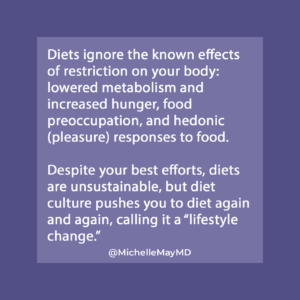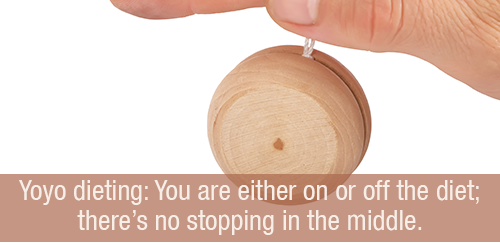For 20+ years of yoyo dieting, I thought there was something wrong with me that needed to be fixed. Ironically, with every diet-try, I became more convinced. The diets seemed to work. Until they didn’t. Then I blamed myself. If that sounds familiar, it’s time for a radical shift in the way you manage your eating!
Yoyo dieting confirmed my worst fears
 Around and around I went…
Around and around I went…
If I thought there was something wrong with me before, yoyo dieting confirmed it.
What I didn’t realize then, but is clear to me now, is that yoyo dieting is a never ending cycle that reinforces itself.
Let’s take a look at the consequences of dieting on your well-being—body, mind, heart, and spirit—to understand why it’s not sustainable.
Yoyo dieting is bad for your well-being
Your well-being encompasses your physical, emotional, intellectual, and spiritual health.
Body
 Diets focus on what and how much you eat and how many calories you burn with exercise—turning your well-being into a math problem to be solved.
Diets focus on what and how much you eat and how many calories you burn with exercise—turning your well-being into a math problem to be solved.
Diets ignore the known effects of restriction on your body. Research has shown the restrictive eating triggers a powerful biological system that reacts to a negative energy balance by lowering your metabolism and increasing hunger, food preoccupation, and hedonic (pleasure) responses to food.(1)
Despite your best efforts, diets are unsustainable. Instead of acknowledging this fact, diet culture pushes you to diet again and again but calls it a “lifestyle change.”
Mind
A narrow, dogmatic approach to eating is counterintuitive because attempting to do things you know you can’t continue for the rest of your life just doesn’t make sense. Overanalyzing and worrying about every eating decision distracts you from more important aspects of your life and limits your productivity and efficiency.
When you “give in” and eat something you really want, you feel guilty. You promise yourself you’ll be “good” tomorrow, feeding your eat-repent-repeat cycle.
Heart
It’s healthy to have strong emotional connections to food, but most diets limit or eliminate the foods you love, leaving you feeling sad or angry. Eating with others becomes difficult, severing the connection we experience when we commune over a meal. When your family, friends, and coworkers don’t have to follow the same rules, you feel awkward, resentful, or left out. You may reach a point when trying to follow the diet doesn’t seem worth it.
Most important, when your triggers for eating are caused by your underlying unmet needs, the urges to eat don’t go away simply by imposing a strict set of rules. This leaves you feeling overwhelmed by cravings that aren’t satisfied by eating.
Spirit
Dieting often leads to inner turmoil, guilt, and a sense of disconnection from the way things were intended to be. What could feel less natural and further from spirituality than eating in a manner that leaves you feeling weak, deprived, and even angry?
Requiring rigid rules to guide your eating sends the message you don’t listen to or trust innate wisdom.
A radical turning point
For me, three things came together to create an end to yoyo dieting and a radical shift in my approach to eating…
- Diet exhaustion. Frankly, I just didn’t want to weigh, measure, and count food – or feel guilty about eating anymore.
- My patients described many of same symptoms and behaviors I had struggled with for years.
- My young children did not!
I realized I wasn’t alone in my frustration with yoyo dieting, but in observing my children, I recognized that it didn’t have to be that way.
Fortunately, this radical shift led me down an entirely new, much wider path.
What’s the alternative?
Diet culture is entrenched in the belief that if we don’t try to control our behavior, we’ll be out of control.
But there is a third radical option: We can learn to be in charge instead. (Read chapter 1 free here to learn more about the difference.)
This radical paradigm shift requires us to honestly look at what hasn’t worked in the past and consider the possibility that it’s not our fault. That flies in the face of diet culture’s “blame the dieter” stance (as in “you just didn’t try hard enough.”)
Ask yourself the following questions:
- Has thinking certain foods are “bad” permanently stopped you from wanting them or eating them?
- Do you crave the foods you’re not “supposed” to eat?
- When you eat a “bad” food, do you feel guilty?
- Do you have trouble stopping once you start?
- And does that make you think you need the rules?
- Do you blame yourself for not being able to stick to a diet long-term?
- Or do you think of diets as temporary anyway?
- Are you done with yoyo dieting?
Cutting the string of yoyo dieting
There is a completely different way to think about eating—even if you didn’t know about it before, don’t fully understand it yet, or don’t believe it could work for you.
Unfortunately, some stay people stay trapped in their old paradigm because it’s comfortable and familiar—in other words, safer.
Or they filter what they hear through their old paradigm, take what fits, and ignore what doesn’t—so it pretty much comes out sounding like the same old thing.
You don’t know what you don’t know
Every day I wake up and recommit myself to our radical mission to change the way the world thinks about eating.
It’s not only possible to break the painful eat-repent-repeat cycle, it is essential!
I have to remind myself the thoughts and beliefs about eating for many of the people I can help the most are deeply ingrained, as mine once were. Of course it will take more in-depth understanding and personal practice to make this radical shift.
If you’re committed to your own radical shift, download chapter 1 of Eat What You Love, Love What You Eat to see the blueprint that will guide you through the process one step at a time. Then choose your path to freedom!
You’ll never look at your eating in the same way again.
(1) Mauldin, K., May, M., Clifford, D. (2022). The consequences of a weight‐centric approach to healthcare: A case for a paradigm shift in how clinicians address body weight. Nutrition in Clinical Practice. https://doi.org/10.1002/ncp.10885
If you enjoyed this article, here are three more to help you:
Diet culture: An outdated paradigm whose time is up
The effects of black and white thinking on eating


16 thoughts on “Yoyo dieting? It’s time for a radical shift”
The turning point for me was moving to South Korea. My husband and I both need to lose weight. We are both over eaters. However, in the past there were nutrition labels that could help us count points, or calories or carbs ad now, there’s Hangul.
I had been looking for a way to get control of my eating when I found the Love what you eat book. I’ve been reading a little everyday, and learning about my eating habits. I am working on my intuitive eating, and using all the nutritional information that I can remember from past diet lives, eat your vegetable, fruits and enough protien to sustain you and don’y forget to get some exercise. After that, theirs mind hunger. I’m learning to do other things besides eat. I’mm not sure I’m losing weight, but I do feel good.
Excellent! I’m back at this AGAIN, and I am -for the first time- approaching it this way too. Getting the weight off is relatively easy. The keeping it off has been the impossible. So I need to spend the next six months I’m losing it figuring out how to change my knee-jerk reaction that causes me to each junk…and un-learn it and replace it with probably more self-nuturing, un-food methods. Thanks for the reinforcement-today and in the future!
Dear Connie,
I love this! Because of your new environment, you were able to take the focus off the numbers – calories, grams, pounds – which are all EXTERNAL measures, and instead focus on your choices and how you are feeling. That is exactly what this radical paradigm shift is all about. Thanks for sharing!
Michelle
Dear Sunny,
You are right – so much of the problem is in the knee jerk reactions. That is why mindfulness is so helpful. By simply pausing for a moment to become aware of what is going on, you discover that there are so many other options. Stay in touch!
Michelle
I desperately need a radical shift. I lost a lot of weight and after 5 months begin gaining weight back. I did a diet where I could eat whatever I wanted but it had to be tiny portions and I could only eat if my stomach was growling. There were many times when my stomach had an empty burning, knot feeling and I would even be light headed and unable to focus but I would not eat because I didn’t have a growl. If I gave into eating without a growl I would feel so guilty and starve myself. It was miserable. I felt guilty if I thought I ate one bite over politely full. I was more obsessed than ever before. It is so hard to change especially since I am gaining weight.
Dear Tanya,
YES! You do need a radical shift! You are definitely caught in the eat-repent-repeat cycle! In fact, you were apparently on a program that turned instinctive eating into a diet – yikes! That completely defeats the purpose.
Please read the first chapter of Eat What You Love, Love What You Eat to better understand what happened (if you don’t have a copy yet, you can download the first chapter free from https://amihungry.com/eat-what-you-love-book.shtml).
In the meantime, whenever you want to eat, pause and ask yourself, “Am I hungry?” but remember, you are not asking this question to decide whether you are allowed to eat, but to understand why you want to!
Dr. May,
I did read the 1st chapter of the book and then I ordered it on amazon.com and got it today. I am reading it right now. It is hard to imagine not being obsessed with food! I have been overeating and dieting since I was about 5 years old. Now I am 36. I have failed 3 times at the intuitive eating thing but I think the diet I was on was very legalistic even though it mentioned hunger and fullness it was still a restrictive diet. I might stay up all night to read the book!
You are right! Many other programs and coaches that teach hunger awareness just turn it into another diet because they don’t understand the problems that restriction causes.
For many people, rules about when, what, and how much to eat cause feelings of deprivation, obsession, cravings, overeating and guilt – in other words, restriction leads to more emotional eating!
I’m SO glad you found Eat What You Love, Love What You Eat. I’ll look forward to hearing from you again.
Comments are closed.